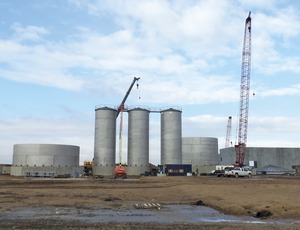
A trio of cellulosic ethanol plants in the final stages of construction in Iowa and Kansas are being threatened by an Environmental Protection Agency proposal aiming to cut federal renewable-fuel mandates.
Officials at Poet-DSM, Dupont Chemical and Abengoa Bioenergy say the plants—each worth $200 million to $250 million—have taken more than a decade to develop and build. According to Poet Bioenergy, the leading U.S. ethanol producer, the industry's duty to fulfill EPA's Renewable Fuel Standard (RFS) is the reason they are being built.
The EPA is expected to announce RFS volumes for 2014 at the end of January. Its current proposal calls to drop the requirement for cellulosic ethanol to 17 million gallons from 1.75 billion gallons this year. EPA says the volume reductions were based on "limitations in the ability of the industry to produce sufficient volumes of qualifying renewable fuel." The three facilities in Hugoton, Kan., and Emmetsburg and Nevada, both in Iowa, are designed to produce a combined 60 million to 75 million gallons this year.
This action comes after two Washington, D.C., circuit-court decisions found that oil refiners could not be penalized for non-compliance with the RFS due to a lack of available product in the market; in other words, refiners can't buy fuel that isn't there. The American Petroleum Institute, the largest U.S. trade group for the oil and gas industries and a plaintiff in these cases, argued EPA cannot set mandates based on "rosy projections," says Carlton Carrol, spokesman for API.
Cellulosic ethanol has been touted as the energy product of the future, a renewable fuel that can be made from agricultural and municipal waste materials; further, it burns clean and does not diminish world feedstuff supplies. The RFS was created to drive innovation and construction of new plants. A number of federal grants and loan guarantees have been issued to lessen the risk of construction costs and other capital investments involved with launching the new biomass-to-fuel conversion technology.
The RFS effectively created a market for cellulosic ethanol by requiring oil refiners to buy the fuel. Thus, EPA should not then reduce its support and risk the success of these high-debt plants still under construction, says Matt Merritt, spokesman for Poet-DSM, Sioux Falls, S.D. The company applied, in 2011, for a $105-million loan guarantee from the U.S. Dept. of Energy. "We just want the mandate to be based on actual production," he says. "The technology has not kept up with mandates [and] continues to fail to meet promises—and refiners are stuck holding the bag."
A group of smaller plants is also under construction, in Rhinelander, Wis.; Blairstown, Iowa, and Ventura and Vicalia, both California, while two other plants, in Vero Beach, Fla., and Columbus, Miss., started demo production in 2013.


Post a comment to this article
Report Abusive Comment